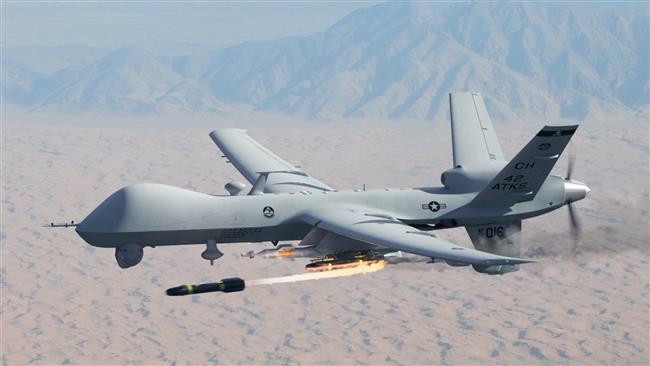
RNA - A Yemeni security official, who spoke on condition of anonymity, said on Sunday that the drone strike hit three vehicles overnight as they were travelling along a road linking the province, located some 570 kilometers southeast of the capital, Sana’a, to the central province of Bayda.
The US carries out drone attacks in Yemen and several other Islamic countries, claiming to be targeting al-Qaeda elements. However, local sources say civilians have been the main victims of the attacks.
The drone strikes in Yemen continue alongside the Saudi military aggression against the impoverished conflict-ridden country.
Saudi Arabia has been incessantly pounding Yemen since March 2015 in an attempt to crush the popular Houthi Ansarullah movement and reinstate former president, Abd Rabbuh Mansur Hadi, who is a staunch ally of the Riyadh regime.
More than 12,000 people have been killed since the onset of the campaign more than two and a half years ago. Much of the Arabian Peninsula country's infrastructure, including hospitals, schools and factories, has been reduced to rubble due to the war.
The Saudi-led war has also triggered a deadly cholera epidemic across Yemen.
Al-Qaeda in the Arabian Peninsula (AQAP) has taken advantage of the chaos and breakdown of security in Yemen to tighten its grip on the southern and southeastern parts of the Arab country.
According to the World Health Organization’s latest count, the cholera outbreak has killed 2,167 people since the end of April and is suspected to have infected 841,906.
Meanwhile, the United Nations has described the current level of hunger in Yemen as “unprecedented,” emphasizing that 17 million people are now food insecure in the country.
It added that 6.8 million, meaning almost one in four people, do not have enough food and rely entirely on external assistance.
A recent survey showed that almost one third of families have gaps in their diets, and hardly ever consume foods like pulses, vegetables, fruit, dairy products or meat.
More than 3 million pregnant and nursing women and children under 5 need support to prevent or cure malnutrition.
847/940